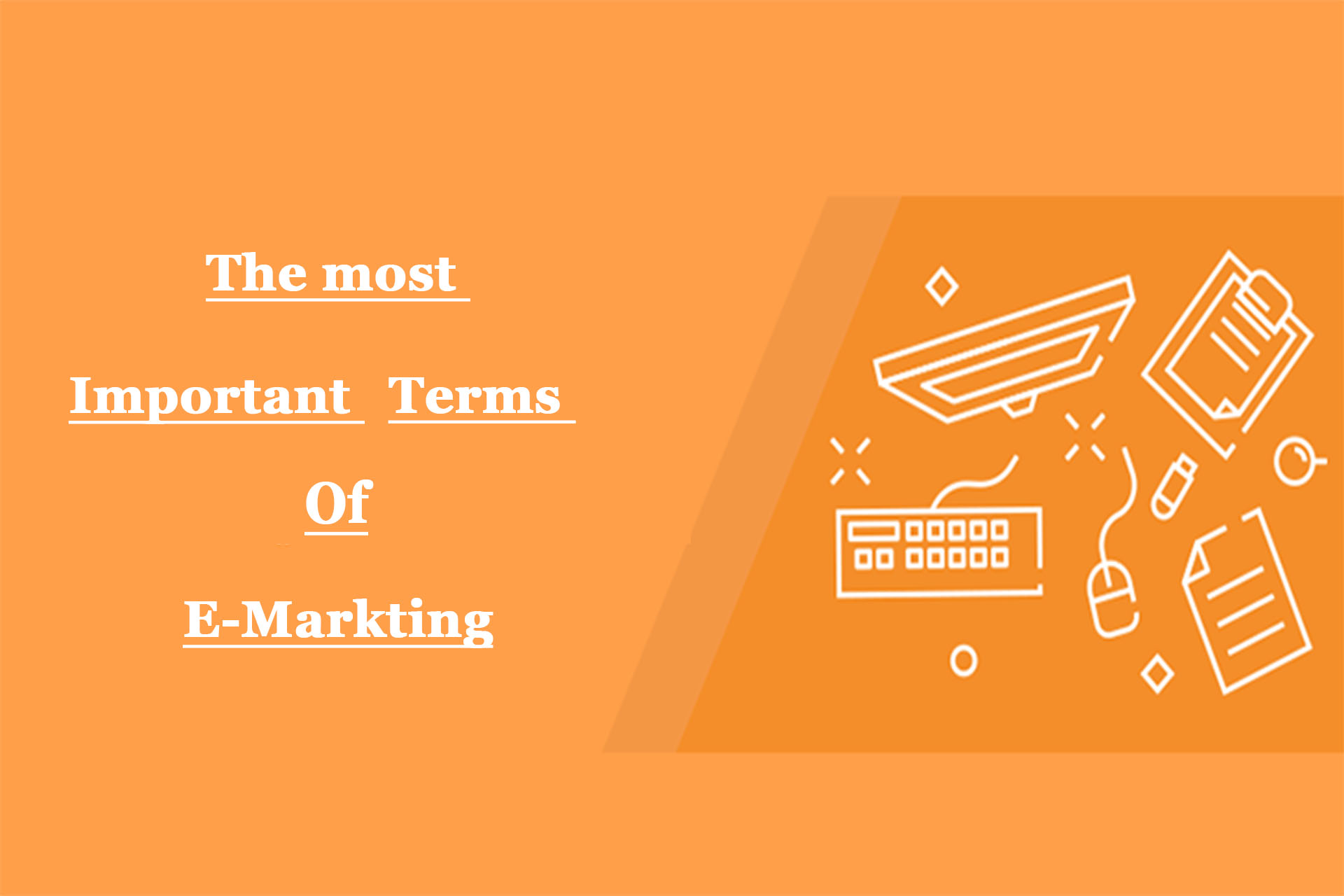The most important terms of E-marketing
The world of e-marketing is increasing day by day, and e-marketing terms are increasing, but there are basic terms and important concepts that must be well known if you are interested in the field of e-marketing and deal with it permanently, but you do not have sufficient knowledge of many terms, or you are at the beginning stage of learning the field.
E-marketing terminology in general:
1- Digital marketing:
One of the most specialized e-marketing terms, which means digital marketing through the Internet; it is used to express marketing using all electronic devices, whether computer, fax or mobile message advertising; and there is also a term that means e-marketing or online marketing through Internet marketing, and it is called Online marketing
2- Inbound marketing:
A modern marketing strategy that relies heavily on building an integrated world around the product or service by using modern means in marketing in order to increase interaction and profits, such as: (blogs, social networks, e-mail, e-book marketing, distinctive content that helps attract the customer to the product or service).
3- Outbound Marketing:
A type of marketing known as old marketing, where companies conduct a dialogue by sending external messages to the audience using traditional paid advertising campaigns, namely television and radio ads, flyers, email, and also annoying ads called (spam advertisements).
4- SMN (Social Media Network):
It means social networking sites such as: (Facebook – Twitter – instgram – Linkdin – telegram) and many other social networking sites.
5- SMM (Social Media Marketing):
It is the process of marketing on various social networking sites, by conducting marketing campaigns to increase visitor interaction and profits; it is one of the most important means of spreading.
6- Search Engine Marketing):
Marketing through search engines, such as (Google); and also through a set of e-marketing operations that seek to improve and increase the visibility of the site in the pages of search engines.
SEO / Search Engine Optimization -7:
One of the important e-marketing terms, which is intended to prepare the site to appear better in the results of search engines through several measures and factors starting from the creation of the site until its configuration and upload to the Internet, taking into account important factors, such as (content and the way the code is written), which improves the appearance of the site in the results of search engines SEO, and is divided into ONPage – OFFPage.
8- Search engine results pages / SERP:
First page results in Google's search engines.
Lead Generation-9:
It is to increase the number of visitors and those interested in the products and services it provides through marketing strategies on how to acquire new channels and alternatives, and work to improve the existing channels that bring the target audience to the site, and the strategies are targeted to a specific group (Audience) by determining the age, geographical area, and other interests of the target group.
10- B2B (Business):
It refers to a company's dealings with another company directly, such as software companies that design systems for other companies; or equipment manufacturing companies, such as (machinery and equipment manufactured for large factories only).
B2C (Business to Customer) – 11:
It means dealing between the company and people by selling products and services individually to the consumer only.
E-marketing advertising terminology:
CPC (Cost per Click -1):
The method of calculating the cost of ads in online advertising campaigns, whether they are ads on Google AdWords or Facebook, where the cost is calculated when you only click on the ad.
CPI) Cost Per Impression -2) :
The method of calculating the cost of ads on the Internet by the number of ad impressions, whether Facebook ads or AdWords, where the cost is calculated per 1000 impressions.
Cost per Action -3) :
How to calculate the cost of online advertising in advertising campaigns according to the achievement of the goal of the advertisement, such as (buying a product or registering data).
CTR (CTR -4):
The percentage between the number of clicks on the ad compared to the number of times it appeared, so if this percentage increases, this indicates the success of the ad.
5- Conversion Rate (CR):
It means the number of people who clicked on the ad to actually buy the product; it appears in percentage, and the more it indicates the success of the ad.
Return on Investment (ROI-6):
The percentage of return on investment, which divides the percentage of advertising between what he paid in the cost of the campaign and what he earned through the campaign.
In other words: how much is paid in advertising, and how much profit through it
We turn to some important e-marketing terms for website pages:
– Pages initialization terms:
It is one of the important e-marketing terms that are used in the pages of the site in order to improve the appearance of the site in the results of search engines.
SEO / SEO -1:
We have mentioned it before in general e-marketing terms, and it is intended to prepare the site to appear better in the results of search engines, through several metrics and factors starting from the creation of the site to its configuration and upload it to the Internet.
Landing page -2 :
The page that appears in the user's search engines, or through ads, and must contain text, images and videos in order to suit the goal of visitors.
Link text -3:
It means the text of the word that appears to the user, which are the main or research words that you target with; it is the same idea as the hyperlink; it also helps in the search engine optimization in terms of the appearance of the site with the words that Anchor Text works for.
Long-tail keywords-4:
The theory of targeting the least competitive and most specialized keywords, to achieve results in a certain specialized way, as the largest and best percentage of searches are done on these words, such as (teaching web programming on Linux) instead of searching on (web education).
Then we move on to the knowledge of page evaluation terms.....
– E-marketing terminology for evaluating pages:
Back Link / Inlink / Incoming Link -1:
One of the strongest and most important basic e-marketing terms; it is intended to publish the link to your site or links to the internal pages of your site in a variety of different sites; and increasing the number of links will raise the ranking of your appearance in search engines.
2- Authority:
It is intended to determine the popularity of a page by the number of links leading to it from trusted sites; it consists of 100 degrees.
PR/ Pagerank -3 :
A value between zero and 10 is determined by Google based on marketing, page effectiveness, popularity, and links to it.
Analytics -4 :
Site analysis in terms of visits, where data about the site is analyzed and collected, statistics and graphs are provided on the number of visitors, the most important pages and other data and analysis, and the most famous applications through which you can analyze the data:
1. Simply Measured
2. Socialbakers
3. Sprout Social
4. Rival IQ
5. Cyfe
6. Google Analytics Custom Report
Bounce Rate -5 :
It means the average percentage of page visitors who exit without seeing other pages; it is used as a criterion to measure visitors' admiration and interest in and benefit from the site; the fewer exits, the better.
After all:
E-marketing terms are very many, but in this article we focused on the basic terms and concepts that are indispensable to know, to help you learn and start in the field of e-marketing, or if you work in the field, these terms will be a good reference for you to be distinguished and the best in your work, as it is based on an understandable, professional and correct marketing method.





